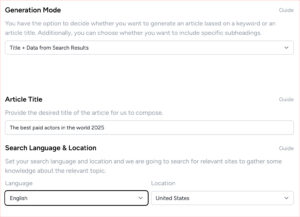In today’s competitive digital landscape, content marketing isn’t just about pushing products or services; it’s about connecting with your audience on a deeper level.
Empathy plays a crucial role in this process, allowing brands to truly understand and resonate with their customers’ needs, desires, and pain points.
By weaving empathy into content marketing strategies, businesses can foster genuine relationships, build trust, and ultimately drive engagement and loyalty.
This article delves into the power of empathy in content marketing, exploring its role and the profound impact it can have on brand success and audience connection.
Understanding Empathy in Marketing
To truly grasp empathy in marketing, it’s essential to understand how it bridges the gap between brands and their audience.
When you put yourself in your customers’ shoes, you can better understand their needs, desires, and pain points. This understanding helps you create messaging that resonates on a deeper level, making your audience feel seen and valued.
Empathy isn’t just about listening; it’s about actively engaging with your audience’s emotions and experiences. By doing so, you’ll foster a stronger connection and build trust.
Your marketing strategies should reflect genuine care and concern for your customers’ well-being. This approach not only humanizes your brand but also encourages customer loyalty.
So, focus on empathy to create meaningful interactions that resonate with your audience.
Importance of Empathy in Content
Empathy in content makes your audience feel heard and understood, creating a genuine connection that fosters trust and loyalty.
When you show empathy, you’re acknowledging your audience’s emotions, challenges, and aspirations. This not only humanizes your brand but also makes your messaging more relatable.
People are more likely to engage with content that resonates on a personal level. By addressing their pain points and offering solutions, you demonstrate that you truly care about their needs.
Empathy also enhances your storytelling, making your content more compelling and memorable. Remember, it’s not just about selling a product or service; it’s about building relationships and providing value.
When your audience feels valued, they’re more likely to stay loyal and advocate for your brand.
Building Consumer Connections
Building consumer connections starts with genuinely understanding and addressing your audience’s needs and desires. You need to listen to their concerns, monitor their feedback, and engage in conversations to grasp what truly matters to them.
By doing this, you’re not just offering a product or service; you’re providing solutions that resonate on a personal level. When you show that you’re tuned into their world, you build trust and loyalty.
Your audience feels valued, and they’re more likely to stick around and engage with your brand. This connection transforms casual consumers into dedicated advocates who’ll not only buy from you but also recommend you to others.
So, keep your communication channels open and always prioritize their needs.
Emotional Relevance in Messaging
Crafting emotionally relevant messages involves understanding and tapping into the emotions that drive your audience’s decisions. You need to know what your audience cares about, their pain points, and what motivates them.
When you address these aspects in your messaging, you create content that feels personal and relevant. Use language and imagery that resonates with your audience’s experiences and aspirations.
You can evoke emotions like joy, trust, or urgency, making your message more compelling. Remember, it’s not just about selling a product; it’s about connecting on a human level.
When your audience feels understood and valued, they’re more likely to engage with your content and take action. Emotional relevance is key to making your marketing messages impactful and memorable.
Enhancing Brand Image with Empathy
Empathy can significantly enhance your brand image by showing your audience that you genuinely care about their needs and experiences. When your brand demonstrates understanding and compassion, it builds trust and loyalty. This connection encourages customers to choose your products or services over competitors.
By addressing your audience’s pain points and aspirations in your communications, you create a relatable and humanized brand persona. Empathy fosters a sense of community and belonging among your audience. When people feel heard and valued, they’re more likely to engage with your brand, share their positive experiences, and advocate for you.
Your brand’s reputation improves as you consistently show that you prioritize customer well-being. Empathy isn’t just a strategy; it’s the foundation for a strong, enduring brand image.
Empathy-driven Content Creation
Empathy-driven content creation involves crafting messages that resonate deeply with your audience’s emotions and experiences. By understanding their needs, struggles, and aspirations, you can create content that speaks directly to them.
Start by listening to your audience through surveys, social media, or direct interactions. Use this insight to address their specific pain points and offer genuine solutions.
Your content should reflect the language, values, and tone that align with your audience’s worldview. This approach makes your messages more relatable and impactful.
When you show that you truly understand and care about your audience, it builds trust and loyalty.
Remember, empathy isn’t just about knowing your audience; it’s about making them feel seen, heard, and valued through your content.
Impact on Audience Engagement
Empathy-driven content significantly boosts audience engagement by making your messages more relatable and compelling. When you understand and address your audience’s pain points, needs, and desires, they feel seen and valued. This emotional connection encourages them to interact with your content, whether through likes, comments, shares, or even purchases.
By speaking directly to the experiences and emotions of your audience, you create a sense of trust and loyalty. They’re more likely to return to your content and recommend it to others.
Empathy helps you craft stories and messages that resonate deeply, making your audience feel as though you’re speaking directly to them. This personalized approach not only captures attention but also fosters a lasting relationship with your brand.
Measuring Empathy’s Effectiveness
Determining the effectiveness of empathy in your content marketing requires a strategic approach to metrics and analytics.
Start by tracking engagement metrics such as likes, shares, and comments. These indicators can show how well your audience connects with your empathetic content.
Next, monitor conversion rates and lead generation to see if your empathetic messages are driving actions.
Don’t forget to use sentiment analysis tools to gauge the emotional tone of audience responses.
Regularly review these metrics and adjust your strategy based on what resonates most.
Finally, conduct surveys and gather feedback directly from your audience to understand their perceptions.
By systematically analyzing these data points, you’ll gain insights into how empathy impacts your marketing success.
How can empathy in content marketing influence customer loyalty and retention?
Understanding your customers’ needs and emotions through empathy in content marketing builds trust and connection.
By resonating with their experiences, you create a bond that enhances customer loyalty and retention, fostering long-term relationships.
What are some common pitfalls to avoid when trying to incorporate empathy into marketing strategies?
When incorporating empathy into marketing, avoid generic messaging that lacks personalization.
Don’t overlook the importance of active listening to truly understand your audience’s needs.
Steer clear of being solely focused on sales rather than building genuine connections.
How does the use of empathy in content marketing vary across different industries or sectors?
In different industries or sectors, empathy in content marketing varies based on audience needs and preferences.
Tailoring messages to resonate with specific demographics and addressing unique pain points can enhance engagement and build stronger connections.
Conclusion
In conclusion, empathy plays a crucial role in content marketing by fostering genuine connections with consumers, enhancing brand image, and driving audience engagement.
By understanding and incorporating empathy into your content creation process, you can create more emotionally relevant messaging that resonates with your target audience.
Remember, empathy is not just a buzzword in marketing – it is a powerful tool that can elevate your brand and make a lasting impact on your customers.





